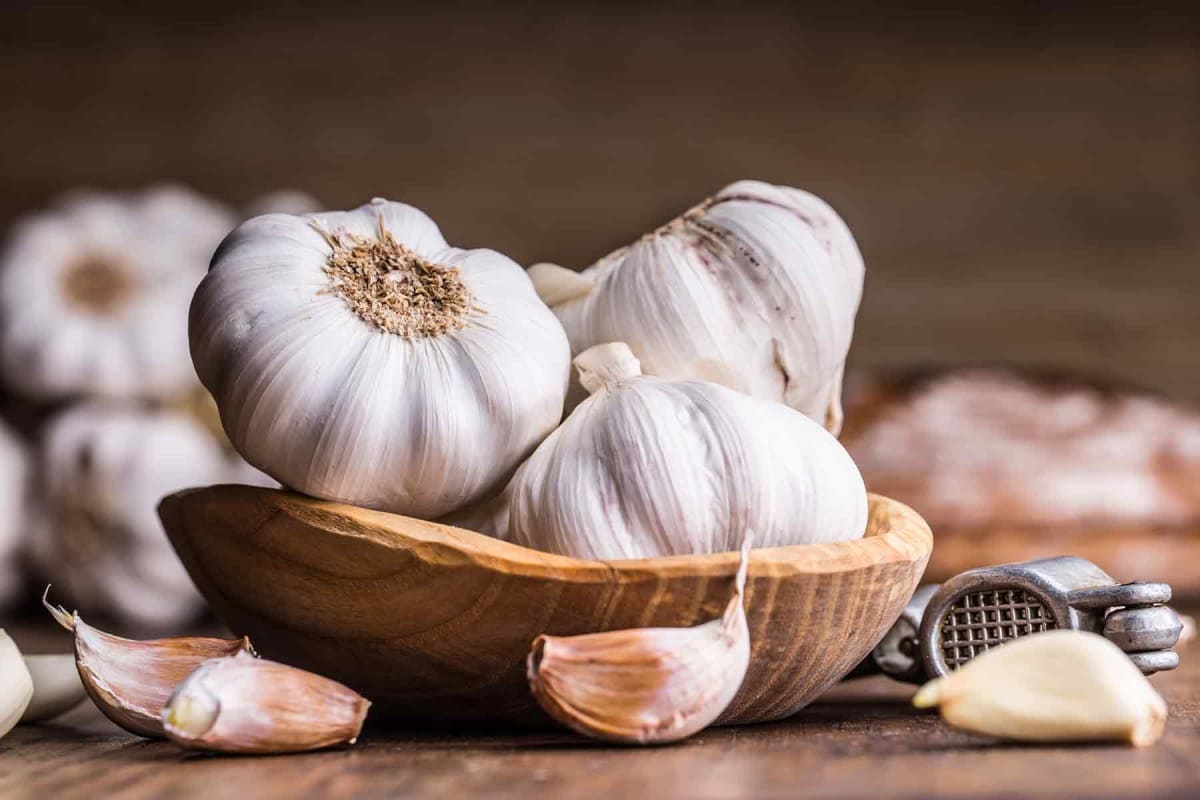
Can dogs eat garlic?
Can dogs eat garlic?
Can dogs have garlic?
Garlic is a popular ingredient in many human foods, but when it comes to our canine companions, the answer is clear: no, dogs should not eat garlic. Garlic belongs to the allium family (along with onions, leeks, and chives) and contains compounds that are toxic to dogs.
Why is garlic bad for dogs?
Garlic contains thiosulfate, a compound that is harmless to humans but toxic to dogs. This substance causes oxidative damage to red blood cells, resulting in hemolytic anemia. When dogs consume garlic, their red blood cells can be damaged, reducing oxygen delivery to tissues throughout the body.
Additionally, garlic toxicity can cause gastrointestinal upset in dogs, including vomiting, diarrhea, dehydration, and abdominal pain.
Signs of garlic poisoning in dogs
Symptoms of garlic poisoning in dogs can appear within 24 hours but more commonly take a few days to develop. Watch for these signs:
Vomiting and diarrhea
Abdominal pain
Decreased appetite
Lethargy and weakness
Pale gums
Increased heart and respiratory rates
Drooling
Panting
Dark urine
Anemia symptoms may develop 1 to 5 days after garlic consumption and include difficulty breathing and extreme lethargy.
Immediate steps if your dog eats garlic
If you suspect your dog has eaten garlic:
Don't panic, but act quickly.
Contact your veterinarian immediately.
Provide details about the amount and time of consumption.
Follow their professional medical advice.
Do not induce vomiting without veterinary guidance.
Treatment for garlic poisoning in dogs
Veterinarians' treatment options for garlic poisoning may include:
Inducing vomiting (if ingestion was recent)
Administration of activated charcoal to absorb toxins
Intravenous fluids to prevent dehydration
Medications to control vomiting and other symptoms
Blood tests to check for anemia
In severe cases, hospitalization and blood transfusions may be necessary.
While garlic poisoning is rarely fatal in dogs, prompt veterinary care is essential to prevent complications and ensure recovery.
How much garlic is dangerous for dogs?
The toxicity of garlic depends on the dog's size and the amount consumed. Generally, consuming 15 to 30 grams of garlic per kilogram of body weight can cause toxic effects. For context, that's about one medium-sized clove per 20-pound dog.
It's important to note that some dogs are more sensitive to garlic toxicity than others. Additionally, consuming smaller amounts over several days can still lead to toxicity.
FAQs about dogs eating garlic
Can dogs have garlic powder?
No, dogs should not have garlic powder. While some sources suggest small amounts might be safe, veterinary experts advise against it. The concentrated nature of garlic powder can make it difficult to control dosage, increasing the risk of toxicity.
Can dogs eat foods with garlic?
No, dogs should avoid all foods containing garlic. Many human foods, including sauces, prepared meals, and seasoned dishes, contain garlic in amounts that could be harmful to dogs.
Can dogs eat garlic bread?
Absolutely not. Garlic bread is doubly problematic for dogs as it contains both toxic garlic and unhealthy amounts of butter, oil, and salt. Even small amounts of garlic bread should be avoided.
What about garlic supplements?
Despite claims about garlic's benefits for flea control or immune support, veterinary experts do not recommend garlic supplements for dogs. The risks outweigh any potential benefits, and there are safer, proven alternatives available for flea and tick prevention.
How to prevent garlic toxicity in dogs
To keep your dog safe from garlic toxicity:
Store garlic and garlic-containing foods out of your dog's reach.
Inform family members and guests not to share food with your dog.
Be cautious with leftovers that might contain garlic.
Read ingredient labels on dog treats and foods.
Use only veterinary-approved flea and tick preventatives.
Consult your veterinarian before introducing any new foods to your dog's diet.

Other toxic foods
Besides garlic, dogs should avoid other members of the allium family:
Onions
Leeks
Chives
These plants contain the same toxic compounds as garlic and can cause similar adverse effects in dogs.
Safe alternatives
Instead of garlic, consider these safe, healthy treats for your dog:
Commercial dog treats formulated specifically for canines
Plain, cooked potatoes (not raw)
Complete and balanced dog food that provides all necessary nutrients without supplementation
Remember, your dog's health and safety should always be the priority. When in doubt about any food, consult your veterinarian before offering it to your pet.